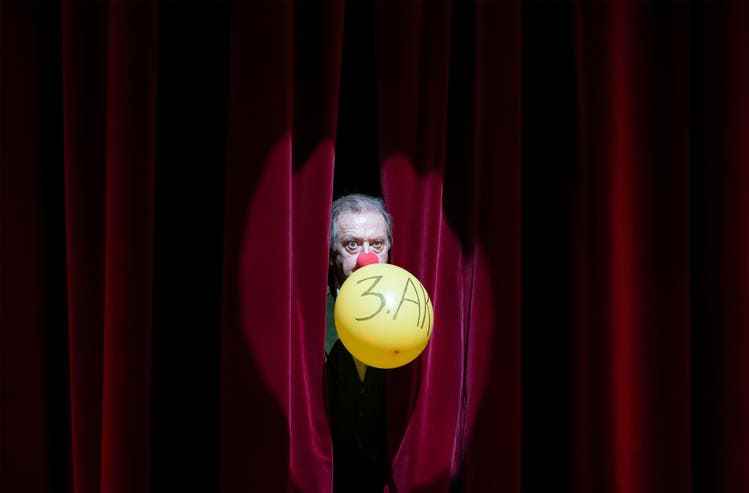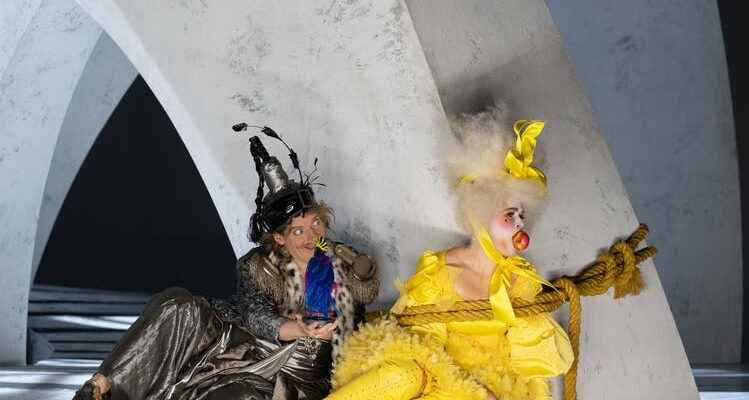Jacques Offenbach’s political satire “Barkouf” was only rediscovered four years ago. Now the Zurich Opera is showing the Swiss premiere of this garishly colorful piece, in which nothing is as it seems.
Backroom conspiracy: Bababeck (Marcel Beekman) wants to harness the clueless Périzade (Siena Licht Miller) for his purposes.
Wow, that’s a hairy story! Because the people of Lahore have once again overthrown their governor (by deliberately throwing him out of the window), the Mughal emperor appoints a dog named Barkouf as the new ruler, to the humiliation of the snarling crowd. His communicative skills are naturally limited, after all he instinctively bites bad guys away. But because that’s not enough to govern, his mistress is hired as an interpreter, and she now interprets every bark and howling, as if by chance, in the interests of the people. No wonder that the masses soon voluntarily fall at the feet of the mighty mutt.
In the competition for the craziest operatic plot, Jacques Offenbach’s “Barkouf” should have good chances for a place on the podium. What is crazy about this opéra bouffe is not just the events, which are of course meant to be hearty political satire – the history of the piece itself also reads curiously: after only seven performances, at the end of 1860 in Paris, the work gathered dust in an archive cabinet of the composer’s heirs for over 150 years, and it is only thanks to the tenacity of the Offenbach researcher Jean-Christophe Keck that attempts at resuscitation took place in Strasbourg and Cologne in 2018. With the Swiss premiere, the Zurich Opera now wants to prove that the full-fledged three-act play with the animal title character is actually viable and repertoire-capable.
The supreme jester of the Belle Époque
The actor Max Hopp was hired for this in Zurich. He was last seen here in Barrie Kosky’s virtuoso adaptation of the Oscar Straus operetta “A woman who knows what she wants” alongside Dagmar Manzel. Hopp has also been staging operas since 2019, for the second time a completely unknown one by Offenbach. It’s no walk in the park and it’s no joke, even if it sounds like it – because nothing about this track is what it looks like.
It starts with the plot, which seems so unconventional on paper. During the performance it remains banal, even when one quickly realizes that the dog story, which was moved to the fairytale Lahore as a precaution – like almost every stage work by Offenbach – is openly aimed at the powerful of the time, in this case Napoleon III. and its authoritarian regime. The Kaiser regarded Offenbach as the supreme jester of the Belle Époque, so to speak, granted him the proverbial freedom of fools and even attended his Paris performances. The first version of the libretto of «Barkouf» was nevertheless banned – a dog as powerful and at the same time as a mistress’ puppet, so even the Parisian censors lost all sense of humor.
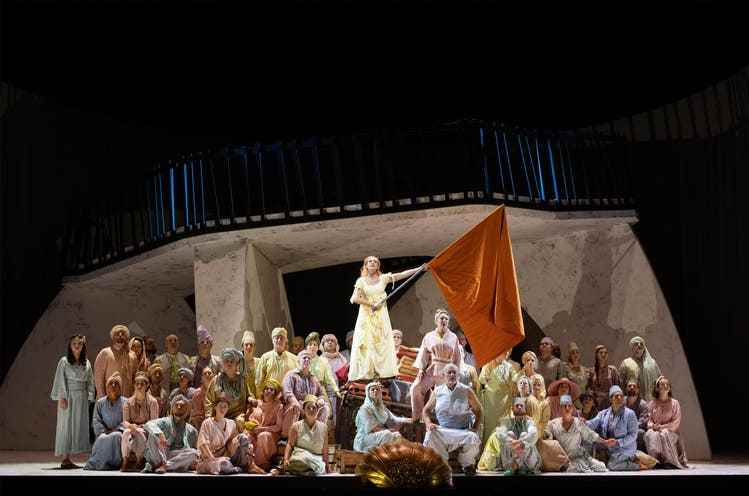
Maïma (Brenda Rae, with flag) fights for the downtrodden people of Lahore.
Why should this still interest us today? Max Hopp provides an answer with his straightforward production, colorfully exaggerated in Ursula Kudrna’s costumes: because it gives visitors two and a half hours of carefree entertainment – which is not to be despised at all in these dark times – and because everyone can imagine who for probably the barkoufs of our contemporary world are. Is that enough? Not quite, because the ambiguities in this play are not as great as the director would have us believe. In any case, the comedy of the satire ignites only to a limited extent. But that’s not too bad, because Offenbach’s music is decisive for the Zurich production and anyway the only decisive factor.
The cigar lights
An expansion of the repertoire would indeed be very welcome with this composer: after all, of the no less than 140 well-known stage plays by the Rhinelander who emigrated to Paris, you can’t always just play his outshining masterpiece “The Tales of Hoffmann” and now and then perhaps one of the delicious satirical antiquities such as “Beautiful Helena” or “Orpheus in the Underworld”. Because of the satirical nature of the plot, one would initially classify «Barkouf» as a comic work, but appearances are deceptive here, too.
The music of the 18 numbers turns out to be much more lyrical than expected, the original orchestration is amazingly nuanced and largely avoids everything superficially loud of the well-known Offenbachiaden, many thematic ideas are beguilingly beautiful and catchy – without a doubt: a first-class Offenbach. However, who a feel-good catchy tune of cancan caliber from «Orpheus» expected, goes away empty-handed – the composer sticks more to the waltz here anyway.
In addition, he quotes himself – from Weber and Rossini via Meyerbeer to early Wagner – right across the European operatic tradition, and with a playful pluralism that even overwhelmed the revolutionary Hector Berlioz: The music reminded him of a child, “who had a firecracker put it in your mouth and want to smoke it like a cigar,” teased the composer of the “Symphonie fantastique”. The two men became unfriends after that.
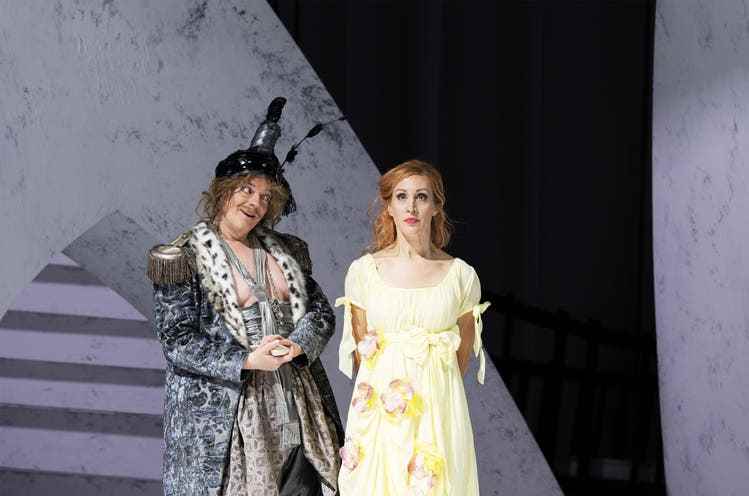
Maïma (Brenda Rae), who understands dogs, doesn’t want to hear any of Bababeck’s (Marcel Beekman) whisperings.
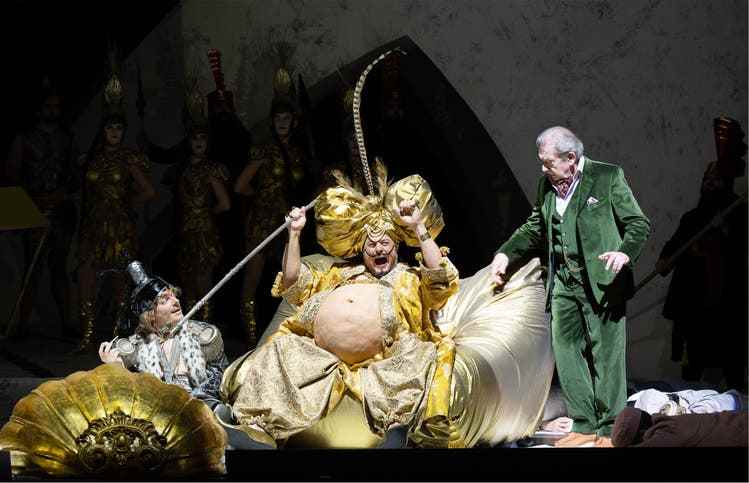
The Great Mogul (Andreas Hörl, center) wants to punish his people by appointing the dog Barkouf as the new governor.
Jérémie Rhorer needs a while on the evening of the premiere with the Philharmonia to find the appropriate lightness of tone and the permanent changes of style. In addition, the heavy perfume of the most recent “Valkyrie” performances still seems to be hanging over the moat. But then the cigar lights up (fortunately without a child), and the characters, who initially seem a bit cliché, come to life.
Brenda Rae in particular brilliantly uses the lead role of the dog-understander Maïma, peppered with coloratura, and makes her a forerunner of the singing doll Olimpia in «Hoffmann». Marcel Beekman portrays her opponent, the schemer Bababeck, as a real banger, who of course falls flat on her stomach in the end from sheer lust for power. The consistently cast ensemble – including an eight-strong dance ensemble – seconded with a lot of humor and speed.
And the dog? He also performs, but again differently than expected. For fans of realism, Marie Caroline Rössle’s expressionistically crooked stage design can catch a glimpse of Barkouf. For friends of clever dramaturgy, Max Hopp has invented a narrator named Jacques Le Chien: the actor André Jung frees the singers from the lengthy original dialogues of Eugène Scribes with intermediate moderation. On the other hand, he provides – a bit in the style of similar conférencier characters in Christoph Marthaler – for escalation and situational comedy. With the best will in the world, you can’t get more out of this piece. It’s quite a lot. Woof!
